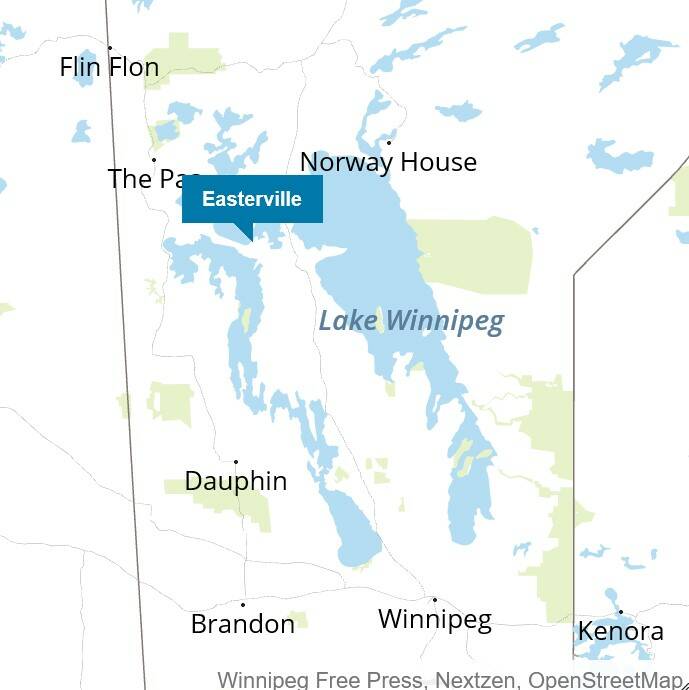The leader of a central Manitoba First Nation is at a loss to explain, let alone address, a shocking crime problem in his community that has two girls, 13 and 14, charged with second-degree murder in the death of a 32-year-old woman.
The victim’s cousin — a 35-year-old woman — was seriously injured in the violence early Saturday and is recovering in a Winnipeg hospital.
Chemawawin Cree Nation Chief Clarence Easter — who knows both women and the accused girls, said the bloodshed has rocked his community, located about 460 kilometres northwest of Winnipeg.
“They’re getting younger and younger, they’re smoking… they’re getting into alcohol and everything. It’s very concerning, as a chief, and I don’t know how to deal with it right now,” he told the Free Press Tuesday.
RCMP were called to the deceased victim’s home in Easterville, a tiny hamlet adjacent to the First Nation, just before 2 a.m. Saturday, where they found the two seriously injured women. First responders provided emergency care, but one of the victims died at the scene.
“It’s crazy, the age of the suspects being arrested in this serious of a crime,” said RCMP spokesperson Sgt. Paul Manaigre. “It’s nothing the public is used to… nothing, really, the police are used to.”
The accused girls are known to police and have prior involvement with the justice system, Manaigre said.
Kelly Gorkoff, chair of the University of Winnipeg’s criminal justice department, said national youth crime rates have largely plateaued or decreased in recent years.
Police-reported violent youth crime in Canada decreased overall by 37 per cent between 2011 and 2021, according to figures from Statistics Canada.
“What’s interesting is most rural communities have lower rates of violent crime because communities are much more connected to each other,” Gorkoff said. “It seems like something got out of control and violence sort of took over.”
She noted the lack of resources in the community. Easterville, located approximately 200 kilometres southeast of The Pas on the south shore of Cedar Lake, had a population of just 44 people in the 2021 census.
“What’s interesting is most rural communities have lower rates of violent crime because communities are much more connected to each other. It seems like something got out of control and violence sort of took over.”– Kelly Gorkoff
“It would certainly lead to fewer places to turn for help if someone was experiencing problems,” she said. “It’s clear that, you know, they would need some guidance coming out of this (incident), not just criminalization or (incarceration) responses.”
During a public safety summit last week, Premier Wab Kinew vowed to address the root causes of crime — including supports for youth — in a safety strategy with input from community leaders that’s expected to be released later this year.
Kinew said he wanted to break the cycle of “gangster university,” which he says takes small-time offenders and incarcerates them, where they get involved with gangs and become more violent.
“Then we release them onto the streets here in Winnipeg, or in ‘small town’ Manitoba or onto reserves. So that cycle… needs to change somehow,” he said last week.

Resources have been deployed to support first responders at the crime scene and others who might need help, Easter said.
“These are our community members and we know them. We see them almost every other day, they’re like family,”he said.
A relative of the dead woman described the mother of one as “caring and loving” and a “mother figure.”
“To me she is someone that would look after me when my dad would be gone for work… just being there for me,” the relative said in a social media message.
She said the victim had a son, twin sister and younger brothers.
The Free Press is not naming the relative or the victims to protect the identities of the accused girls.
Gorkoff pointed to the “revolving door” of the youth criminal justice system, which often doesn’t provide social interventions for convicted young people, leading to their repeat interactions with law enforcement.
Manaigre said being proactive is the only way to address addictions and violence in the community, which go hand in hand.
“Try to take care of one so that it helps the other,” he said. “Because let’s say you start falling behind, then you’re starting to deal with just the consequences of those concerns.”
nicole.buffie@freepress.mb.ca

Nicole Buffie
Multimedia producer
Nicole Buffie is a multimedia producer who reports for the Free Press city desk.